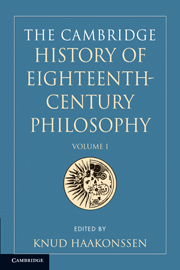Book contents
- Frontmatter
- CONTENTS
- Preface
- Methods of reference and abbreviations
- List of contributors
- I The Concept of Eighteenth-Century Philosophy
- 1 The History of Eighteenth-Century Philosophy: History or Philosophy?
- 2 Concepts of Philosophy
- 3 Schools and Movements
- 4 The Institutionalisation of Philosophy in Continental Europe
- 5 The Curriculum in Britain, Ireland, and the Colonies
- 6 Informal Networks
- II The Science of Human Nature
- Biobibliographical Appendix
- Bibliography
- References
5 - The Curriculum in Britain, Ireland, and the Colonies
from I - The Concept of Eighteenth-Century Philosophy
Published online by Cambridge University Press: 28 March 2008
- Frontmatter
- CONTENTS
- Preface
- Methods of reference and abbreviations
- List of contributors
- I The Concept of Eighteenth-Century Philosophy
- 1 The History of Eighteenth-Century Philosophy: History or Philosophy?
- 2 Concepts of Philosophy
- 3 Schools and Movements
- 4 The Institutionalisation of Philosophy in Continental Europe
- 5 The Curriculum in Britain, Ireland, and the Colonies
- 6 Informal Networks
- II The Science of Human Nature
- Biobibliographical Appendix
- Bibliography
- References
Summary
Philosophy, which once dominated the arts curriculum, still had a significant place in it in the eighteenth century. Many entered on a course intending to go into the Church or to become schoolteachers; for others, their studies were preparatory to training in law or medicine. Philosophy in its full extent included logic, metaphysics (primarily ontology), pneumatology (the philosophy of mind and spirits, and natural theology), moral philosophy (ethics, natural jurisprudence, and politics), and natural philosophy. Institutions and teachers differed over the balance, content, and separability of these elements. Philosophy was supplemented with studies in Latin, which was universally the language of instruction at the start of the century, and often in Greek and mathematics. A new service subject, history, had a shaky start in some institutions, being aimed at the sons of aristocratic and landed families who might not attend the full course. Before the century’s end, additional studies were emerging as autonomous offshoots from philosophy, such as rhetoric and political economy. Of the three foundational subjects in the medieval trivium, only logic kept its place. Grammar and rhetoric became the preserve of either the Latin or the logic teacher. By the end of the eighteenth century, however, the art of public persuasion was the specialism of law and divinity students. In the arts programme, rhetoric had been appropriated to the written rather than the spoken word and to the study of literary criticism.
- Type
- Chapter
- Information
- The Cambridge History of Eighteenth-Century Philosophy , pp. 97 - 120Publisher: Cambridge University PressPrint publication year: 2006
References
- 2
- Cited by



